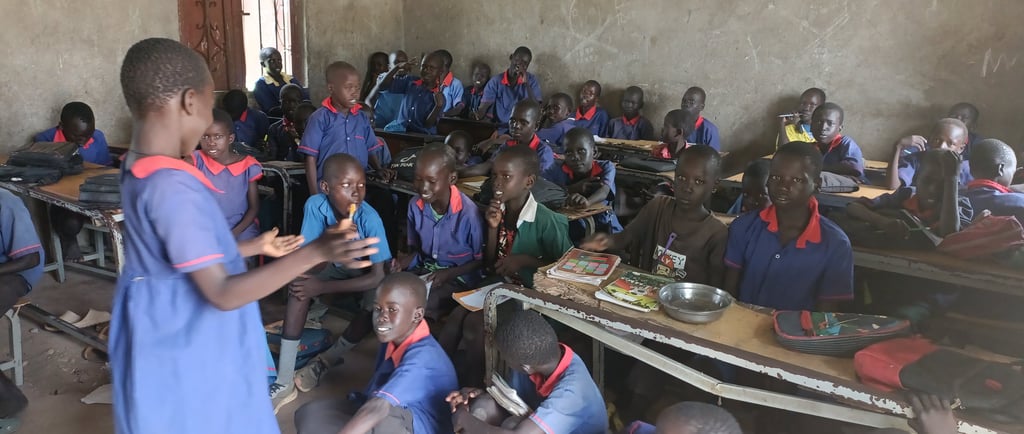Rebuilding Trust in Education: Addressing the Teacher Pay Crisis in South Sudan
Published by Education Action in Crisis (EAC) In collaboration with the Center for African Education at Teachers College, Columbia University
EDUCATION ACTION IN CRISIS
3 min read


Published by Education Action in Crisis (EAC)
In collaboration with the Center for African Education at Teachers College, Columbia University
Why Teacher Compensation in South Sudan Demands Urgent Attention
Teachers are the lifeblood of South Sudan’s education system, yet they remain among the most underappreciated and underpaid professionals in the country. Amid widespread instability, displacement, and economic hardship, educators are striving to hold classrooms together—but many are doing so without reliable pay, professional recognition, or basic support.
A newly published research study—conducted by Education Action in Crisis (EAC) and the Center for African Education at Teachers College, Columbia University, and funded by Education International (EI)—sheds light on the harsh realities facing South Sudanese teachers and outlines practical recommendations to rebuild trust and stability in the sector.
What the Research Reveals: A Fragmented and Failing System
The study, Teacher Compensation in South Sudan: The Human Cost of Underinvestment, explores the structure of teacher pay in the country and how it contributes to high attrition, low morale, and poor learning outcomes. The findings are sobering:
Only 30% of teachers are on the government payroll
37% of teachers are volunteers, many working without formal contracts
Nearly 40% lack formal teaching qualifications
Teachers earn as little as $3 to $58 per month, depending on their status and region
Beyond the numbers, the research documents a deep sense of frustration among teachers who face delayed or missing salaries, no job security, and limited access to professional development. These issues are not just financial—they reflect a broader breakdown of the social contract between the state and its educators.
The Hidden Cost: Children Are Losing Out
Underpaid, unsupported teachers are more likely to be absent, unmotivated, or to leave the profession altogether. This directly affects children’s access to quality education. In 2024 alone, over 1,200 schools were closed due to teacher shortages, conflict, or lack of learners. As a result, thousands of children—especially girls and those in remote or crisis-affected areas—are being denied the opportunity to learn.
When teachers are in survival mode, students suffer. A stable and fairly compensated teaching workforce is essential to reversing this trend.
EAC’s Role in Driving Evidence-Based Solutions
Education Action in Crisis (EAC) was proud to co-lead this study to amplify the voices of teachers across South Sudan. Our research combined field interviews, salary data, and policy analysis to understand the three main categories of teacher employment:
Government teachers – often face salary delays and must take side jobs to survive.
Volunteer teachers – work under NGO contracts with low or irregular stipends.
Incentive teachers – particularly in refugee settings, receive stipends via UNHCR or humanitarian organizations, yet still earn below a livable wage.
Our findings revealed inconsistencies, inequities, and inefficiencies across the board, pointing to a system that is not built to serve its teachers—or its students.
What Needs to Happen Next: Turning Insights into Action
The report doesn’t just highlight problems—it offers a roadmap for reform. Here are key recommendations from the study:
1. Increase and Prioritize Education Funding
Ensure regular and adequate salaries for all teacher profiles
Advocate for both domestic and international investment in teacher compensation
2. Modernize and Streamline Payroll Systems
Use digital systems to reduce corruption and improve reliability
Address salary arrears transparently and fairly
3. Invest in Teachers as Professionals
Provide certification pathways for volunteer and incentive teachers
Offer pensions, health insurance, and career development opportunities
Strengthen teacher unions to advocate for rights and reforms
4. Build Inclusive Data Systems
Establish a national Education Management Information System (EMIS) and a Refugee EMIS (REMIS) to track teacher status, pay, qualifications, and performance
Rebuilding the Social Contract: A National Priority
At its core, this crisis is not just about money—it’s about recognition, dignity, and justice. The current system has broken the trust between teachers and the institutions meant to support them. To rebuild South Sudan’s education sector, we must start by honoring teachers—not just in words, but in wages and working conditions.
Join the Movement to Support Teachers
Education Action in Crisis is committed to advancing teacher welfare as a cornerstone of educational recovery and peacebuilding in South Sudan. We call on the Ministry of General Education and Instruction, international donors, and civil society to act on the report’s findings and to work collaboratively toward a more equitable system.
📘 Read the full report here: Education International’s report
🧑🏫 Learn more about EAC’s work on education in crisis: EAC Programs Page
📩 Contact us to collaborate or support our advocacy efforts
Teachers deserve more. South Sudan deserves better.
Let’s invest in those who invest in our children.
© 2026 Education Action in Crisis




